| Listing 1 - 10 of 13 | << page >> |
Sort by
|
Book
ISBN: 1474416551 1474430449 1474416543 9781474416542 9781474430449 9781474416535 1474416535 9781474416559 1474432301 Year: 2017 Publisher: Edinburgh : Edinburgh University Press,
Abstract | Keywords | Export | Availability | Bookmark
 Loading...
Loading...Choose an application
- Reference Manager
- EndNote
- RefWorks (Direct export to RefWorks)
Explores how Deleuze's thought was shaped by Lucretian atomism - a formative but often-ignored influence from ancient philosophy.
More than any other 20th-century philosopher, Deleuze considers himself an apprentice to the history of philosophy. But scholarship has ignored one of the more formative influences on Deleuze: Lucretian atomism. Deleuze's encounter with Lucretius sparked a way of thinking that resonates throughout all his writings: from immanent ontology to affirmative ethics, from dynamic materialism to the generation of thought itself. Filling a significant gap in Deleuze Studies, Ryan J. Johnson tells the story of the Deleuze-Lucretius encounter that begins and ends with a powerful claim: Lucretian atomism produced Deleuzianism.
Deleuze, Gilles, --- Lucretius Carus, Titus --- Lukrecjusz Karus, Tytus --- Lukret︠s︡iĭ Kar, Tit --- Lucrezio, Tito --- Lucrèce --- Lucrez --- Lukrez --- Lucrecio Caro, T. --- Caro, T. Lucrecio --- Carus, Titus Lucretius --- Lucretius --- Lucrezio Caro, Tito --- Lucrecio --- Lucreti Cari, T. --- Lucreci --- לוקרציוס קרוס, טיטוס --- Deleuze, G. --- Delëz, Zhilʹ, --- Dūlūz, Jīl, --- دولوز، جيل --- Criticism and interpretation. --- Delezi, Jier, --- HISTORY / Ancient / Rome. --- Lucrezio
Book
ISBN: 9780199605408 0199605408 019175059X 1299539106 0191650803 9780191650802 9780191750595 Year: 2013 Publisher: Oxford ; New York : Oxford University Press,
Abstract | Keywords | Export | Availability | Bookmark
 Loading...
Loading...Choose an application
- Reference Manager
- EndNote
- RefWorks (Direct export to RefWorks)
The volume unites the three aspects - poetry, philosophy, and science - found in Lucretius' 'De Rerum Natura'. With ten original essays and an analytical introduction, the volume aims not only to combine different approaches within single covers but to offer responses to the poem by experts from all three scholarly backgrounds.
Didactic poetry, Classical --- Poésie didactique classique --- History and criticism. --- Histoire et critique --- Lucretius Carus, Titus. --- Lucretius Carus, Titus --- Criticism and interpretation. --- Poésie didactique classique --- Pre-Socratic philosophers --- Pre-Socratics --- Presocratic philosophers --- Presocratics --- Philosophers --- Lucrèce --- Lukrez --- Lukrecjusz Karus, Tytus --- Lukret︠s︡iĭ Kar, Tit --- Lucrezio, Tito --- Lucrèce --- Lucrez --- Lucrecio Caro, T. --- Caro, T. Lucrecio --- Carus, Titus Lucretius --- Lucretius --- Lucrezio Caro, Tito --- Lucrecio --- Lucreti Cari, T. --- Lucreci --- לוקרציוס קרוס, טיטוס --- Epic poetry --- Lucrezio
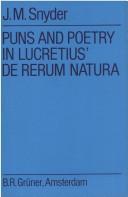
ISBN: 9060321243 9789060321249 Year: 1980 Publisher: Amsterdam: Grüner,
Abstract | Keywords | Export | Availability | Bookmark
 Loading...
Loading...Choose an application
- Reference Manager
- EndNote
- RefWorks (Direct export to RefWorks)
Didactic poetry, Latin --- Puns and punning in literature --- History and criticism --- Lucretius Carus, Titus --- -Puns and punning in literature --- Latin didactic poetry --- Latin poetry --- Lukrecjusz Karus, Tytus --- Lukret︠s︡iĭ Kar, Tit --- Lucrezio, Tito --- Lucrèce --- Lucrez --- Lucrecio Caro, T. --- Caro, T. Lucrecio --- Carus, Titus Lucretius --- Lucretius --- Lucrezio Caro, Tito --- Lucrecio --- Lucreti Cari, T. --- Lucreci --- לוקרציוס קרוס, טיטוס --- Puns and punning in literature. --- History and criticism. --- Lucretius Carus, Titus. --- Lucrèce --- Lukrez --- Didactic poetry, Latin - History and criticism --- Lucretius Carus, Titus - De rerum natura
Book
ISBN: 1283321580 9786613321589 0226648516 9780226648514 6613321583 9781283321587 0226648494 9780226648491 Year: 2011 Publisher: Chicago ; London : University of Chicago Press,
Abstract | Keywords | Export | Availability | Bookmark
 Loading...
Loading...Choose an application
- Reference Manager
- EndNote
- RefWorks (Direct export to RefWorks)
With The Lucretian Renaissance, Gerard Passannante offers a radical rethinking of a familiar narrative: the rise of materialism in early modern Europe. Passannante begins by taking up the ancient philosophical notion that the world is composed of two fundamental opposites: atoms, as the philosopher Epicurus theorized, intrinsically unchangeable and moving about the void; and the void itself, or nothingness. Passannante considers the fact that this strain of ancient Greek philosophy survived and was transmitted to the Renaissance primarily by means of a poem that had seemingly been lost-a poem insisting that the letters of the alphabet are like the atoms that make up the universe. By tracing this elemental analogy through the fortunes of Lucretius's On the Nature of Things, Passannante argues that, long before it took on its familiar shape during the Scientific Revolution, the philosophy of atoms and the void reemerged in the Renaissance as a story about reading and letters-a story that materialized in texts, in their physical recomposition, and in their scattering. From the works of Virgil and Macrobius to those of Petrarch, Poliziano, Lambin, Montaigne, Bacon, Spenser, Gassendi, Henry More, and Newton, The Lucretian Renaissance recovers a forgotten history of materialism in humanist thought and scholarly practice and asks us to reconsider one of the most enduring questions of the period: what does it mean for a text, a poem, and philosophy to be "reborn"?
Materialism --- Philosophy, Ancient. --- Philosophy, Renaissance. --- Philosophy, Modern --- Renaissance philosophy --- Ancient philosophy --- Greek philosophy --- Philosophy, Greek --- Philosophy, Roman --- Roman philosophy --- History. --- Lucretius Carus, Titus --- Lukrecjusz Karus, Tytus --- Lukret︠s︡iĭ Kar, Tit --- Lucrezio, Tito --- Lucrèce --- Lucrez --- Lukrez --- Lucrecio Caro, T. --- Caro, T. Lucrecio --- Carus, Titus Lucretius --- Lucretius --- Lucrezio Caro, Tito --- Lucrecio --- Lucreti Cari, T. --- Lucreci --- לוקרציוס קרוס, טיטוס --- Influence. --- Philosophy, Ancient --- Philosophy, Renaissance --- History --- Influence (Literary, artistic, etc.). --- Materialism. --- Philosophie. --- Rezeption. --- Lukrez. --- Lucretius Carus, Titus, --- Lucretius Carus, Titus. --- Lucrezio
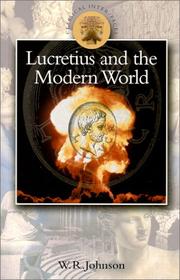
ISBN: 1472539907 1472502272 9781472502278 9780715628829 9781472539908 0715628828 9780715628829 9781472502285 1472502280 Year: 2006 Publisher: London Bloomsbury Academic, an imprint of Bloomsbury Pub. Plc
Abstract | Keywords | Export | Availability | Bookmark
 Loading...
Loading...Choose an application
- Reference Manager
- EndNote
- RefWorks (Direct export to RefWorks)
"Lucretius' On the Nature of Things - one of the glories of Latin literature - provides a vivid poetic exposition of the doctrines of the Greek atomist, Epicurus. The poem played a crucial role in the reinvention of science in the seventeenth century, its influence on the French Enlightenment was powerful and pervasive, and it became a major battlefield in the wars of religion with science in nineteenth-century England. But in the twentieth century, despite its vital contributions to modern thought and civilisation, it has been largely neglected by common readers and scientists alike. This book offers an extensive description of the poem, with special emphasis on its cheerful version of materialism and on its attempt to devise an ethical system that suits such a universe. It surveys major relevant texts form the eighteenth and nineteenth centuries (Dryden, Diderot, Voltaire, Tennyson, Santayana) and speculates on why Lucretius and the ancient scientific tradition he championed has become marginalised in the twentieth century. It closes with a discussion of what value the poem has for students of science and technology in the new century: what advice it has to offer us about how to go about reinventing our machines and our morality."--Bloomsbury Publishing Lucretius' On the Nature of Things - one of the glories of Latin literature - provides a vivid poetic exposition of the doctrines of the Greek atomist, Epicurus. The poem played a crucial role in the reinvention of science in the seventeenth century, its influence on the French Enlightenment was powerful and pervasive, and it became a major battlefield in the wars of religion with science in nineteenth-century England. But in the twentieth century, despite its vital contributions to modern thought and civilisation, it has been largely neglected by common readers and scientists alike. This book offers an extensive description of the poem, with special emphasis on its cheerful version of materialism and on its attempt to devise an ethical system that suits such a universe. It surveys major relevant texts form the eighteenth and nineteenth centuries (Dryden, Diderot, Voltaire, Tennyson, Santayana) and speculates on why Lucretius and the ancient scientific tradition he championed has become marginalised in the twentieth century. It closes with a discussion of what value the poem has for students of science and technology in the new century: what advice it has to offer us about how to go about reinventing our machines and our morality
Atomism. --- Atomic theory --- Philosophy --- Philosophy, Ancient --- Pluralism --- Lucretius Carus, Titus. --- Lucretius Carus, Titus --- Lukrecjusz Karus, Tytus --- Lukret︠s︡iĭ Kar, Tit --- Lucrezio, Tito --- Lucrèce --- Lucrez --- Lukrez --- Lucrecio Caro, T. --- Caro, T. Lucrecio --- Carus, Titus Lucretius --- Lucretius --- Lucrezio Caro, Tito --- Lucrecio --- Lucreti Cari, T. --- Lucreci --- לוקרציוס קרוס, טיטוס --- Influence. --- Influence (Literary, artistic, etc.) --- Artistic impact --- Artistic influence --- Impact (Literary, artistic, etc.) --- Literary impact --- Literary influence --- Literary tradition --- Tradition (Literature) --- Art --- Influence (Psychology) --- Literature --- Intermediality --- Intertextuality --- Originality in literature
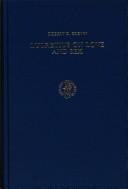
ISBN: 9004085122 9789004085121 Year: 1987 Volume: 15 Publisher: Leiden: Brill,
Abstract | Keywords | Export | Availability | Bookmark
 Loading...
Loading...Choose an application
- Reference Manager
- EndNote
- RefWorks (Direct export to RefWorks)
Lucretius Carus, Titus --- Love in literature --- Sex in literature --- 871 LUCRETIUS CARUS, TITUS --- Latijnse literatuur--LUCRETIUS CARUS, TITUS --- Lukrecjusz Karus, Tytus --- Lukret︠s︡iĭ Kar, Tit --- Lucrezio, Tito --- Lucrèce --- Lucrez --- Lucrecio Caro, T. --- Caro, T. Lucrecio --- Carus, Titus Lucretius --- Lucretius --- Lucrezio Caro, Tito --- Lucrecio --- Lucreti Cari, T. --- Lucreci --- לוקרציוס קרוס, טיטוס --- Love in literature. --- Sex in literature. --- Lucretius Carus, Titus. --- 871 LUCRETIUS CARUS, TITUS Latijnse literatuur--LUCRETIUS CARUS, TITUS --- Lucrèce --- Lukrez --- Lucretius / en liefde. --- Lucretius / en sekse. --- Lucrèce. De natura rerum. --- Lucrèce / et amour. --- Lucrèce / et sexe. --- Lucretius. De natura rerum. --- Lucretius Carus, Titus - De rerum natura - Liber 4
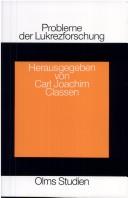
ISBN: 3487076608 9783487076607 Year: 1986 Volume: 18 Publisher: Hildesheim: Olms,
Abstract | Keywords | Export | Availability | Bookmark
 Loading...
Loading...Choose an application
- Reference Manager
- EndNote
- RefWorks (Direct export to RefWorks)
Lucretius Carus, Titus --- Didactic poetry, Latin --- Philosophy, Ancient, in literature. --- Poésie didactique latine --- Philosophie ancienne dans la littérature --- History and criticism. --- Histoire et critique --- Lucretius Carus, Titus. --- Philosophy, Ancient, in literature --- History and criticism --- 871 LUCRETIUS CARUS, TITUS --- -Philosophy, Ancient, in literature --- ROLDUC-SEMI --- #GROL:SEMI-1-05'-00' Lucr --- Latin didactic poetry --- Latin poetry --- Latijnse literatuur--LUCRETIUS CARUS, TITUS --- Lukrecjusz Karus, Tytus --- Lukret︠s︡iĭ Kar, Tit --- Lucrezio, Tito --- Lucrèce --- Lucrez --- Lucrecio Caro, T. --- Caro, T. Lucrecio --- Carus, Titus Lucretius --- Lucretius --- Lucrezio Caro, Tito --- Lucrecio --- Lucreti Cari, T. --- Lucreci --- לוקרציוס קרוס, טיטוס --- 871 LUCRETIUS CARUS, TITUS Latijnse literatuur--LUCRETIUS CARUS, TITUS --- Lucrèce --- Lukrez --- Poésie didactique latine --- Philosophie ancienne dans la littérature --- Didactic poetry, Latin - History and criticism --- Lucretius Carus, Titus - De rerum natura
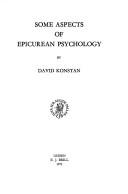
ISBN: 9004036539 9004320466 9789004036536 9789004320468 Year: 1973 Volume: v. 25 Publisher: Leiden, Brill
Abstract | Keywords | Export | Availability | Bookmark
 Loading...
Loading...Choose an application
- Reference Manager
- EndNote
- RefWorks (Direct export to RefWorks)
Emotions --- Human behavior --- Comportement humain --- Epicurus --- Lucretius Carus, Titus --- Action, Human --- Behavior, Human --- Ethology --- Human action --- Human beings --- Human biology --- Physical anthropology --- Psychology --- Social sciences --- Psychology, Comparative --- Feelings --- Human emotions --- Passions --- Affect (Psychology) --- Affective neuroscience --- Apathy --- Pathognomy --- Behavior --- Lukrecjusz Karus, Tytus --- Lukret︠s︡iĭ Kar, Tit --- Lucrezio, Tito --- Lucrèce --- Lucrez --- Lucrecio Caro, T. --- Caro, T. Lucrecio --- Carus, Titus Lucretius --- Lucretius --- Lucrezio Caro, Tito --- Lucrecio --- Lucreti Cari, T. --- Lucreci --- לוקרציוס קרוס, טיטוס --- Epikuros --- Ėpikur --- Epiḳoros --- Epicuro --- Epikouros --- Abīqūr --- Yibijiulu --- Epicure --- Epʻikʻurosŭ --- Έπίκουρος --- Emotions. --- Human behavior. --- Lucretius Carus, Titus. --- Epicurus. --- Lucrèce --- Lukrez --- Ἐπίκουρος --- Epʻikʻuros --- De rerum natura (Lucretius Carus, Titus) --- T. Lucreti Cari De rerum natura libri sex (Lucretius Carus, Titus) --- Titi Lucretii Cari poetae ac philosophi vetustiss. De rerum natura libri sex (Lucretius Carus, Titus) --- Titi Lucretij Cari poetae ac philosophi uetustiss. De rerum natura libri sex (Lucretius Carus, Titus) --- Titi Lucretii Cari De rerum natura libri sex (Lucretius Carus, Titus) --- Lucretius Carus, Titus - De rerum natura
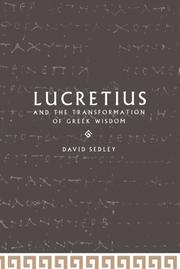
ISBN: 1107113318 1280429143 9786610429141 0511172052 051102083X 0511149948 0511309929 0511482388 0511053606 9780511020834 9780511482380 9780521570329 0521570328 9780521542142 0521542146 9781107113312 9781280429149 6610429146 9780511172052 9780511149948 9780511309922 9780511053603 Year: 1998 Publisher: Cambridge [England] ; New York : Cambridge University Press,
Abstract | Keywords | Export | Availability | Bookmark
 Loading...
Loading...Choose an application
- Reference Manager
- EndNote
- RefWorks (Direct export to RefWorks)
This book is designed to appeal both to those interested in Roman poetry and to specialists in ancient philosophy. In it David Sedley explores Lucretius' complex relationship with Greek culture, in particular with Empedocles, whose poetry was the model for his own, with Epicurus, the source of his philosophical inspiration, and with the Greek language itself. He includes a detailed reconstruction of Epicurus' great treatise On Nature, and seeks to show how Lucretius worked with this as his sole philosophical source, but gradually emancipated himself from its structure, transforming its raw contents into something radically new. By pursuing these themes, the book uncovers many unrecognised aspects of Lucretius' methods and achievements as a poetic craftsman.
Didactic poetry, Latin --- Philosophy, Ancient, in literature. --- Latin poetry --- History and criticism. --- Greek influences. --- Lucretius Carus, Titus. --- Lucretius Carus, Titus --- Theophrastus --- Empedocles --- Epicurus --- Empédocle --- Empedokles --- Feofrast --- Theophrast --- Théophraste --- Theophrastos --- Teofrasto --- Theophrastus, --- Θεόφραστος --- Lukrecjusz Karus, Tytus --- Lukret︠s︡iĭ Kar, Tit --- Lucrezio, Tito --- Lucrèce --- Lucrez --- Lukrez --- Lucrecio Caro, T. --- Caro, T. Lucrecio --- Carus, Titus Lucretius --- Lucretius --- Lucrezio Caro, Tito --- Lucrecio --- Lucreti Cari, T. --- Lucreci --- לוקרציוס קרוס, טיטוס --- Ἐπίκουρος --- Epikouros --- Epikuros --- Ėpikur --- Epiḳoros --- Epicuro --- Abīqūr --- Yibijiulu --- Epicure --- Epʻikʻurosŭ --- Knowledge --- Greece. --- Influence. --- Philosophy, Ancient, in literature --- History and criticism --- Greek influences --- Poésie latine --- Poésie didactique latine --- Philosophie ancienne dans la littérature --- Influence grecque --- Histoire et critique --- Arts and Humanities --- History --- Influence --- Didactic poetry [Latin ] --- Philosophy [Ancient ] in literature --- Lucretius Carus, Titus. - De rerum natura. --- Didactic poetry, Latin - History and criticism. --- Latin poetry - Greek influences. --- Lucrezio --- Didactic poetry, Latin - History and criticism --- Latin poetry - Greek influences --- Lucretius Carus, Titus - De rerum natura --- Empedocles - Influence --- Epicurus - Influence
Book
ISBN: 1108954405 1108957676 1108845053 9781108949446 9781108845052 1108949444 9781108954402 1108957471 Year: 2021 Publisher: Cambridge, United Kingdom: New York, NY, USA: Cambridge University Press,
Abstract | Keywords | Export | Availability | Bookmark
 Loading...
Loading...Choose an application
- Reference Manager
- EndNote
- RefWorks (Direct export to RefWorks)
"The role of Greek thought in the final days of the Roman republic is a topic that has garnered much attention in recent years. This volume of essays, commissioned specially from a distinguished international group of scholars, explores the role and influence of Greek philosophy, specifically Epicureanism, in the late republic. It focuses primarily (although not exclusively) on the works and views of Cicero, premier politician and Roman philosopher of the day, and Lucretius, foremost among the representatives and supporters of Epicureanism at the time. Throughout the volume, the impact of such disparate reception on the part of these leading authors is explored in a way that illuminates the popularity as well as the controversy attached to the followers of Epicurus in Italy, ranging from ethical and political concerns to the understanding of scientific and celestial phenomena"--
Philosophy, Ancient. --- Epicurus --- Cicero, Marcus Tullius. --- Lucretius Carus, Titus. --- Influence. --- Ancient philosophy --- Greek philosophy --- Philosophy, Greek --- Philosophy, Roman --- Roman philosophy --- Lukrecjusz Karus, Tytus --- Lukret︠s︡iĭ Kar, Tit --- Lucrezio, Tito --- Lucrèce --- Lucrez --- Lukrez --- Lucrecio Caro, T. --- Caro, T. Lucrecio --- Carus, Titus Lucretius --- Lucretius --- Lucrezio Caro, Tito --- Lucrecio --- Lucreti Cari, T. --- Lucreci --- לוקרציוס קרוס, טיטוס --- Cicero, Marcus Tullius --- T︠S︡it︠s︡eron, Mark Tulliĭ --- Cyceron --- Cicéron --- Kikerōn --- Cicerón, M. Tulio --- Ḳiḳero --- Cicerone --- M. Tulli Ciceronis --- Cicéron, Marcus --- Cicerón, Marco Tulio --- Ḳiḳero, Marḳus Ṭulyus --- Tullius Cicero, Marcus --- Cicerone, M. T. --- Kikerōn, M. T. --- Cicerone, M. Tullio --- Cicero --- Cicero, M. T. --- Cyceron, Marek Tulliusz --- ציצרון, מארקוס טולליוס --- קיקרו, מארקוס טוליוס --- קיקרו, מרקוס טוליוס --- キケロ --- 西塞罗 --- Ἐπίκουρος --- Epikouros --- Epikuros --- Ėpikur --- Epiḳoros --- Epicuro --- Abīqūr --- Yibijiulu --- Epicure --- Epʻikʻurosŭ --- Lucrezio --- Epicurus - Influence --- Philosophy, Ancient
| Listing 1 - 10 of 13 | << page >> |
Sort by
|

 Search
Search Feedback
Feedback About UniCat
About UniCat  Help
Help News
News